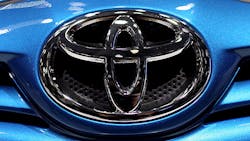Toyota: ‘Electrification Doesn’t Mean Death of IC Engine’
TRAVERSE CITY, MI – Sexy battery-electric vehicles from Tesla and others are in the news, but Toyota, which arguably has more experience selling electrified vehicles than anyone, outlines a very different electrification strategy at the Center for Automotive Research’s Management Briefing Seminars here.
Ben Schlimme, powertrain executive program manager-Advanced Planning and Research, Toyota Motor North America, presents a vision of the future that includes a broad portfolio of hybrid-electric vehicles, plug-ins and fuel-cell cars and trucks going out to 2050.
Citing Toyota’s history of success selling electrified vehicles, including 10 million hybrid-electric vehicle sales globally since 1997 and 3.2 million in the U.S., he says success is born out of delivering a compelling value proposition to consumers in an ever-evolving market, not selling a specific type of propulsion system.
Toyota is developing many powertrains for the future, including a fuel-cell system for heavy-duty commercial trucks, but Schlimme still is bullish on Toyota’s latest internal-combustion engines which now are exceeding 40% thermal efficiency, an almost unheard-of number in the engine world until recently.
In fact, he spends a good part of his presentation touting Toyota’s new 2.5L Dynamic Force engine in the ’18 Camry that delivers 206 hp and 41 mpg (5.7 L/100 km) on the highway.
Not only does the engine offer compact-car like mileage in a spacious family sedan, but it is designed to mate well with electric motors in HEV configurations.
Electrification and ICE engines partner well together, he says, and the two promise to deliver high efficiency and customer-pleasing performance in mainstream Corolla-type vehicles for decades to come.
“Electrification will play a significant role in the future, but that doesn’t mean the death of the ICE engine,” Schlimme emphasizes.
“Our electrification pathway relies on these improvements of our internal-combustion engine, hence we put a lot of effort ensuring that this base engine delivers on those principles.”
The automaker also has created a fuel-cell-powered commercial truck with a range of 300 miles (483 km) that quickly can be refueled and makes 1,300 lb.-ft. (1,763 Nm) of torque.
And Toyota has a business plan for battery-electric vehicles he can’t yet reveal. However, he says the plan provides for EV vehicles in specific segments and markets. “There’s not one single (EV) solution for the market,” Schlimme says.
